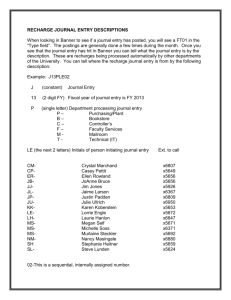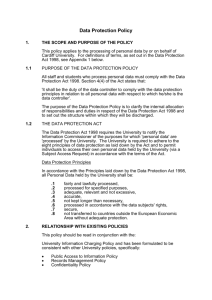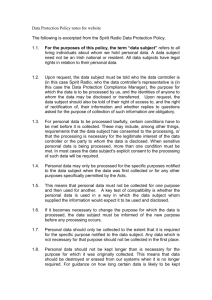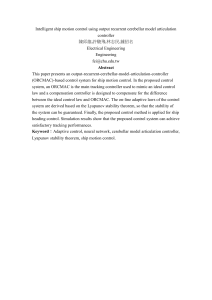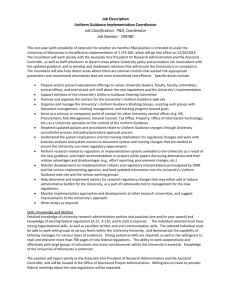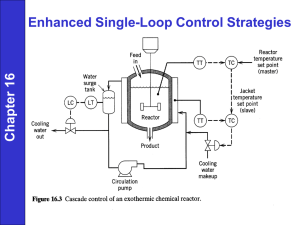Act on Processing of Personal Data
advertisement
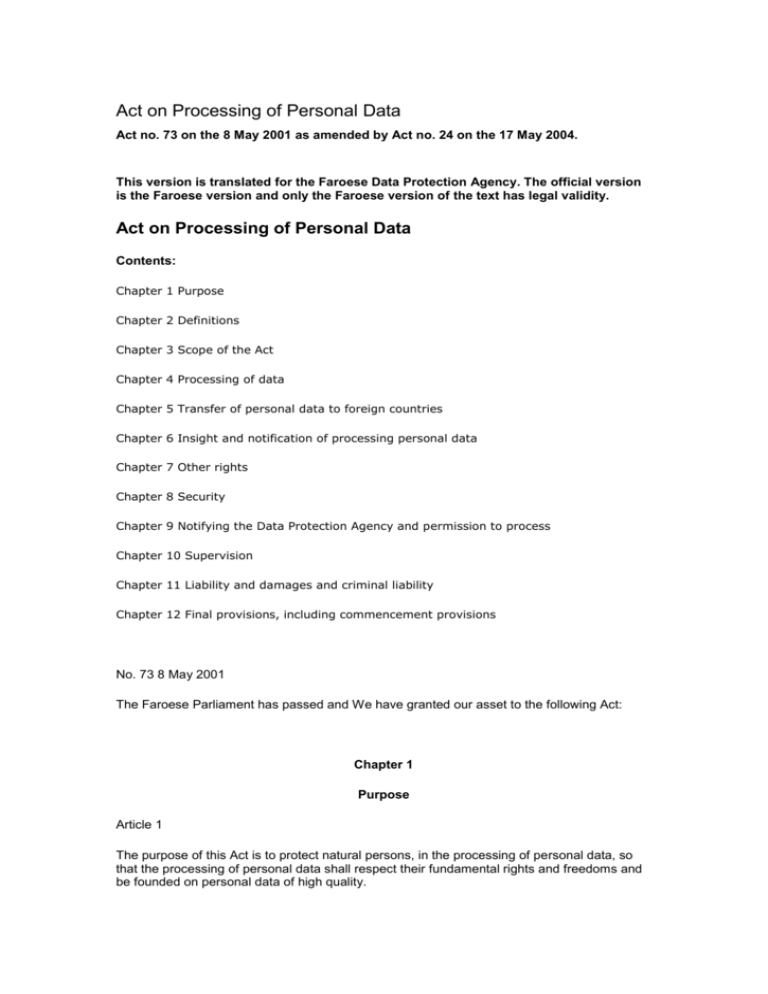
Act on Processing of Personal Data Act no. 73 on the 8 May 2001 as amended by Act no. 24 on the 17 May 2004. This version is translated for the Faroese Data Protection Agency. The official version is the Faroese version and only the Faroese version of the text has legal validity. Act on Processing of Personal Data Contents: Chapter 1 Purpose Chapter 2 Definitions Chapter 3 Scope of the Act Chapter 4 Processing of data Chapter 5 Transfer of personal data to foreign countries Chapter 6 Insight and notification of processing personal data Chapter 7 Other rights Chapter 8 Security Chapter 9 Notifying the Data Protection Agency and permission to process Chapter 10 Supervision Chapter 11 Liability and damages and criminal liability Chapter 12 Final provisions, including commencement provisions No. 73 8 May 2001 The Faroese Parliament has passed and We have granted our asset to the following Act: Chapter 1 Purpose Article 1 The purpose of this Act is to protect natural persons, in the processing of personal data, so that the processing of personal data shall respect their fundamental rights and freedoms and be founded on personal data of high quality. Chapter 2 Definitions Article 2 For the purpose of this Act: 1) "Personal data" "Personal data" shall mean any information relating to an identified or identifiable natural person ("data subject"). 2) "Processing" "Processing of personal data" shall mean any operation or set of operations which is performed upon personal data, whether or not by automatic means, such as, recording, organization, storage, adaptation, collection and further. 3) "Personal data filing system" "Personal data filing system" ("filing system") shall mean any structured set of personal data, which are accessible according to specific criteria whether centralized, decentralized or dispersed on a functional or geographical basis. 4) "Controller" "Controller" shall mean the natural or legal person, public authority, agency or any other body which alone or jointly with others determines the purposes and means of the processing of personal data and determines which equipment can be used. 5) "Processor" "Processor" shall mean a natural or legal person, public authority, agency or any other body which, processes personal data on behalf of the controller. 6) "Third party" "Third party" shall mean a natural or legal person, public authority, agency or any other body other than the data subject, the controller, the processor and the persons who, under the direct authority of the controller or the processor, are authorized to process the data. 7) "Recipient" "Recipient" shall mean a natural or legal person, public authority, agency, or any other body to whom data are disclosed, whether a third party or not; however, authorities which may receive data in the framework of a particular inquiry shall not be regarded as recipients. 8) "The data subject's consent" "The data subject's consent" shall mean any freely given specific and informed indication of his wishes by which the data subject signifies his agreement to personal data relating to him being processed. 9) "Sensitive data" "Sensitive data" shall mean data about collar and family bonds, about religion, philosophy or political conviction, about relations concerning penalty or sexual life, health, trade union connections, relative social problems and other private concerns. 10) "Foreign countries" Denmark and Greenland are also to be considered as foreign countries. Chapter 3 Scope of the Act Objective scope Article 3 This Act shall apply to the processing of personal data in the private and public sector, if: 1) the processing of personal data is wholly or partly by automatic means, 2) personal data which form part of a filing system or are intended to form part of a filing system and this is a non-automatic systematic processing of data. Part 2. This Act shall not apply to the processing of personal data undertaken by a natural person with a view to the exercise of activities of a purely private nature. Part 3. The Minister of Justice may decide that the provisions of this Act shall apply, in full or in part, to the processing of personal data concerning companies, institutions, firms, etc., which are performed for private persons or public bodies. Part 4. The Minister of Justice may decide provisions to the processing of personal data concerning, particular activities, particular companies, particular working and branch of trade and within certain fields of responsibility. Part 5. The Minister of Justice may decide that the provisions of this Act shall not apply, in full or in part, to particular institutions and particular fields of responsibility. Other legislation Article 4 Any rules on the processing of personal data in other legislation, which give the data subject a better legal protection, shall take precedence over the rules laid down in this Act. Access with reference to the Act of Administration Article 5 This Act shall not restrict access according to the Act of Administration, the Act of Public Access to documents or according to other legislation concerning access to personal data. Part 2. If other legislation gives access to more personal data than this Act, the controller shall guide the data subject of these other rights. The freedom to speech Article 6 Processing of personal data, which takes place exclusively for artistic, literary or journalistic purposes shall be governed exclusively by Article 31 and Article 46. Part 2. Information data bases for journalistic purposes which only contain data which already has been published shall be governed exclusively by Article 31 and Article 46. Provided that the data are stored in the data base in the original version published. Geographical territory of the Act Article 7 This Act shall apply to processing of personal data carried out on behalf of a controller who is established in the Faroe Island and to processing of personal data carried out on behalf of a public controller, if this controller is within the home rule authority. Part 2. This Act shall also apply to a controller who is established outside the Faroe Island, if: 1) the processing of data is carried out with the use of equipment situated in the Faroe Island, unless such equipment is used only for purposes of transit of data concerning the country, or 2) the collection of data in the Faroe Island takes place for the purpose of processing in a foreign country. Part 3. A controller who is governed by this Act in accordance with Part 2 shall designate a representative established in the territory of the Faroe Island. Part 4. The controller shall inform the Data Protection Agency in writing of the name and address of the designated representative, cf. Part 3. The rules applicable to the controller are also applicable to the representative. Chapter 4 Processing of data Principal rules on processing of data Article 8 The controller shall notify the data subject when processing of personal data is carried out, cf. Articles 18 to 25, and notify the Data Protection Agency, cf. Articles 32 to 35, and see to that personal data shall be processed in accordance with good practices in a way which fulfils these conditions: 1) granted permission to process, 2) the collection shall only take place for specified and legitimate purposes in accordance with the profession of the processor and they shall not be further processed in a way incompatible with these purposes, 3) the data shall be relevant and not excessive in relation to the purposes for which the data are collected and the purposes for which they are subsequently processed, 4) the data shall not be used for other purposes which are not in accordance with the original purpose without the data subject has given his explicit consent, 5) the data collection may not be kept in a form which makes it possible to identify the data subject for a longer period than is necessary for the purposes for which the data are processed, and 6) the processing of data shall be accurate and organized in a way which ensures the required up-dating of the data. Furthermore, necessary checks should be made to ensure that data, which turns out to be inaccurate or misleading shall be erased or rectified without delay. Part 2. If further processing of personal data takes place exclusively for historical, statistical or scientific purposes, shall this processing not be considered incompatible with the purposes for which the data were collected if the public interests clearly override the interest of the person to whom the data relate. Demands on processing of data Article 9 Personal data may be processed only if, the data subject has given his consent, the processing is subject to statutory authority; or processing is necessary: 1) for the performance of a contract with the data subject or to which the data subject is a party, or in order to take steps at the request of the data subject prior to entering into a contract, 2) for compliance with a legal obligation to which the controller is subject, 3) in order to protect the vital interests of the data subject, 4) for the performance of a task carried out in the public interest, 5) for the performance of a task carried out in the exercise of official authority vested in the controller or a third party to whom the personal data are disclosed, or 6) for the purposes of the legitimate interests pursued by the controller or by the third party to whom the data are disclosed, and these interests are not overridden by the interests of the data subject. Part 2. The processing of data concerning the data subject financial standing and creditworthiness, for the purpose of warning others from contracting with the data subject, or concerns of his employment matters, shall obtain consent from the data subject. Part 3. A company or private person may not disclose data concerning a consumer to a third party for the purpose of marketing or use such data on behalf of a third party for this purpose, unless the data subject has given his explicit consent. Particular demands on processing of sensitive data Article 10 Sensitive data mentioned in Article 2, Part 1, subsection 9, may be processed only if, permission is obtained, cf. article 35, part 1, and the processing fulfils one of the conditions in Article 9, Part 1, subsections 1 to 6, and also one of the conditions in this article. 1) the data subject has given his explicit consent, 2) processing is subject to statutory authority, 3) processing is necessary in order to protect the vital interests of the data subject; or of another person where the person concerned is physically or legally incapable of giving his consent, 4) processing relates to personal data which have been made public by the data subject, 5) processing is necessary for the establishment, exercise or defence of legal claims, 6) processing is necessary for the purpose of the legitimate interests pursued by the controller or by the third party to whom the data are disclosed, 7) processing is necessary for the purpose of preventive medicine, medical diagnosis, the provision of care or treatment or the management of health care services, and where those personal data are processed by a health professional subject to a statutory obligation of professional secrecy, 8) processing of personal data concerning trade union affiliation is necessary for the controller's compliance with employment obligations or specific rights, or 9) processing is necessary for the purpose of history, statistical or scientific studies, and the inconvenience relating to the data subject is less than the benefit of society. Processing is not related to transfer of personal data, which requires permission from the Data Protection Agency. Part 2. The processing of sensitive data may be carried out in the course of it legitimate activities by a foundation, association or any other non-profit-seeking body with a political, philosophical, religious or trade-union aim, no matter the conditions mentioned in Part 1, subsections 1 to 9, relating to the members of the body or to persons who have regular contact with it in connection with its purposes. Further disclosure of such personal data may only take place if the data subject has given his express consent. Part 3. The Data Protection Agency can grant permission to the processing of sensitive data in other situations where processing is necessary because of public interest, and arrangements are carried out to protect the interest of the person to whom the personal data relate. The Data Protection Agency may lay down more detailed conditions. Civil registration number Article 11 Official authorities may process data concerning civil registration numbers with a view to unambiguous identification or as file numbers. Part 2. Private individuals and bodies may process data concerning civil registaration numbers where: (1) this follows from law, (2) the data subject has given his explicit consent, or (3) the processing is carried out for history, scientific or statistical purposes. Part 3. The processing in Part 2, subsections 1 and 2 is not related to transfer of data, which only is permitted if: (1) the transfer follows from law, (2) the data subject has given his explicit consent, or (3) the transfer is required by official authority, or (4) the transfer is a natural element of the ordinary operations of companies, etc, of the types mentioned and is of decisive importance for an unambiguous identification of the data subject. Part 4. Irrespective of the provision laid down in subsections 1 to 3, no disclosure may take place of a civil registration number without explicit consent. Criminal convictions Article 12 A complete register of criminal convictions may be kept only under the control of an official authority. Legal information systems Article 13 Sensitive data in Article 10 may be processed in legal information systems of significant social importance when the processing is necessary for operating such systems. Part 2. The data mentioned in part 1, may not subsequently be proposed for any other purpose. The same shall apply to the processing of other data which is carried out solely for the purpose of operating legal information systems. Part 3. The Data Protection Agency may lay down more detailed conditions concerning the processing operations mentioned in Part 1. The same shall apply to the personal data, which are processed solely in connection with the operation of legal information systems. Data storage Article 14 Data covered by this Act may be transferred to storage in a filing system under the rules laid down in the legislation on files. Telecommunication Article 15 Official authorities and private companies, etc. may not carry out any automatic registration of the telephone numbers to which calls are made from their telephones. However, such registration may take place with the prior authorization from the supervisory authority in cases where important private or public interests speak in favour hereof. The Data Protection Agency may lay down more detailed conditions for such registration. Part 2. The provision laid down in Part 1 shall not apply where otherwise provided by statute. Part 3. The suppliers of telecommunication network and by teleservices may register numbers called, either for own use or for use in connection with technical control. Chapter 5 Transfer of personal data to foreign countries Fundamental demands Article 16 1) Transfer to a foreign country of personal data may take place only if the foreign country in question ensures an adequate level of protection. The adequacy of the level of protection afforded by a foreign country shall be assessed in the light of all the circumstances surrounding a data transfer operation, the purpose and duration of the processing operation, the nature of the data, the rules of law in force in the foreign country in question and the professional rules and security measures which are complied with in that country. Permission is required from the Data Protection Agency cf. Article 35, Part 6. 1) Part 2. In spite of part 1, the Minister of Justice may, after having received a statement from the Data Protection Agency, decide provisions for, to which foreign countries personal data can be transferred without permission from the Data Protection Agency. Exceptions Article 17 The Data Protection Agency may authorize a transfer of personal data to foreign countries, cf. Article 35, Part 6 even if the foreign country in question do not ensures an adequate level of protection if: 1) the data subject has given his explicit consent to the transfer, 2) the transfer is required by international conventions or because of membership in an international community, 3) the transfer is necessary for the performance of a contract with the data subject or to do what is required, to implement pre-contractual measures taken in response to the data subject's request, 4) the transfer is necessary for the conclusion or performance of a contract concluded in the interest of the data subject with a third party, 5) the transfer is necessary in order to protect the vital interests of the data subject, 6) the transfer is necessary in order to identify, submit in to force or protect a legal claim, 7) the transfer is necessary or legally required on important public interest grounds, or 8) Statutory authority exists when data is required from a public register. Part 2. The Data Protection Agency may authorise a transfer of personal data to a foreign country, which does not comply with the provisions laid down in Part 1, where the controller adduces adequate safeguards with respect to the protection of the rights of the data subject. More detailed conditions may be laid down for the transfer. 1) Part 3. (Deleted) Chapter 6 Insight and notification of processing personal data Public insight Article 18 Each and everybody has the right to demand to be informed about which personal data a controller is processing, and be provided with the following information: 1) the name and address of the controller and of his representatives, 2) who has the day-to-day responsibility toward the controller, 3) the purpose of the processing and its name, 4) the register personal groups and the categories of the data concerned, 5) the source of the personal data, and 6) if, the personal data is further disclosed to what personal groups or persons. Own insight Article 19 If the data subject is demanding insight the controller shall communicate to him in an intelligible form about: 1) the name and address of the controller and of his representatives, 2) who has the day-to-day responsibility toward the controller, 3) the purpose of the processing and its name, 4) which personal data are being processed, 5) the source of the personal data, 6) if, the personal data is further disclosed to what personal groups or persons, and 7) the security measures in the processing, as long as this insight does not harm security. Part 2. The data subject has the right to demand accurate information cf. Part 1, which is necessary to enable the data subject to safeguard his interests. Information to be provided when data is obtained from the data subject Article 20 Where the personal data have been obtained from the data subject, the controller shall provide the data subject with the following information: 1) the name and address of the controller and of his representative, 2) the purposes of the processing and its name, 3) if, the personal data is further disclosed to whom, 4) if, the data subject has a duty to inform as well as possible consequences of failure to do so, and 5) of other information necessary to enable the data subject to safeguard his interests in accordance with the law, including the rules about insight and corrections of data relating to the data subject. Part 2. The provisions of Part 1, shall not apply where the data subject already has the information mentioned in subsections 1 to 5. Information to be provided when data is obtained from others than the data subject Article 21 Where the data have been obtained from others than the data subject, the controller, who is collecting the data, shall provide the data subject with information about which personal data are collected and, immediately after provide the data subject with information, cf. Article 20, Part 1, subsections 1 to 5. Part 2. The rules concerning the duty to inform as laid down in Part 1 shall not apply, 1) where the data subject already has the information referred to in Article 20, Part 1, subsections 1 to 5, 2) where recording or disclosure is laid down by law, 3) where the provision of such information to the data subject proves impossible or would involve a disproportionate effort, in these cases the data subject shall be informed if reachable at the latest, when the personal data is being processed. Derogation from the right to insight and to be informed Article 22 Article 18, and Article 19, concerning insight and Article 20, Part 1, and Article 21, Part 1, concerning information to be provided, shall not apply to personal data, which: 1) when disclosed can endanger national security, defense or the relationship with third countries, 2) shall be kept secret because of the prevention, investigation, detection and prosecution of criminal offence, 3) is not considerate that the data subject shall be informed because of health conditions or close personal bonds with the data subject, 4) are included to the promise of secrecy within legislation, 5) only are used in the office and not disclosed to others, or 6) if the data subject's interest in obtaining information is found to be overridden by vital public and private interest. Part 2. When insight is declined this shall be reasoned by showing to authority. Part 3. Data, which are processed on behalf of the public administration is the course of its administration procedures may be exempted from the right of access to the same extent as under the rules of Article 2, Articles 7 to 11 and Article 14 of the Act on Public Access to Documents in Administrative Files. Part 4. The provisions in Article 18 shall not apply when personal data are processed solely for history, scientific and statistic purposes and when personal data solely are storage as personal data as long as necessary according to the aim of the processing. Part 5. The Minister of Justice may lay down further rules concerning provisions of insight and notification not applicable and other conditions concerning insight and notification. How to inform Article 23 Communication in accordance with Chapter 6 shall be in writing, if requested. In cases where the interests of the data subject speak in favour thereof, the communication may, however, be in the form of oral information about the contents of the data. Respite Article 24 The controller shall reply to requests about insight or other rights, cf. Chapter 6 without delay and at the latest 4 weeks from receipt of the request. Part 2. If special causes contribute that is not possible to reply within 4 weeks, the reply shall be available when possible. The controller shall inform the person in question of the grounds for this and of the time at which the decision can be expected to be available. Reproduction Article 25 A data subject who has received a communication in accordance with Article 19 shall not be entitled to a new communication until 6 months after the last communication. Part 2. If the data subject can prove that he has a specific interest to that effect, a depart from the rules can be done. Chapter 7 The data subject's other rights Article 26 The data subject may at any time object to the processing of data relating to him. Part 2. Where the objection under part 1, is justified, the processing may no longer involve those personal data. Article 27 The controller shall on his own, or at the request from the data subject rectify, erase or block personal data, which turn out to be inaccurate or misleading or in any other way processed in violation of law or regulations. Part 2. The controller shall on his own, or at the request of the data subject notify the third party to whom the personal data has been disclosed of any rectification, erasure or blocking carried out in compliance with, cf. Part 1. However, this shall not apply if such notification proves impossible or involves a disproportionate effort. Article 28 The Minister of Justice may lay more detailed rules concerning how wrongfully or incomplete data shall be corrected. Article 29 The data subject may withdraw his consent. Article 30 The data subject may file a complaint to the Data Protection Agency concerning the processing of data relating to him. Chapter 8 Security Article 31 Individuals, companies etc. performing work for the controller or the processor and who have access to data may process these only on instructions from the controller, the process shall be in accordance with the provisions provided by Part 3 to 5. Part 2. The carrying out of processing by way of a processor shall be governed by a written contract between the parties. This contract shall stipulate that the processor shall act only on instructions from the controller and that the rules laid down in Part 3 to 5 shall also apply to processing by way of a processor as to the controller. Part 3. With appropriate technical and organizational security measures the controller and the processor shall provide that the processing of personal data gratify the provisions laid down in this act concerning reliability, personal freedom and insight, and implement appropriate technical and organizational security measures to protect personal data against accidental or unlawful destruction, loss or alteration and against unauthorized disclosure, abuse or other processing in violation of the provisions laid down in this Act. Documentary proves of organizational security measures shall be available to employers employed with the controller and processor as to the Data Protection Agency. The controller is entitled to, upkeep the measures required within this Act. Part 4. The controller instruction may not restrict journalistic freedom or impede the production of an artistic or literary product. Part 5. The rules in Part 3 and 4 shall also apply to personal data, which are given to others than the processor. Part 6. As regards personal data which are processed for the public administration and which are of special interest to foreign powers, measures shall be taken to ensure that they can be disposed of or destroyed in the event of war or similar conditions. Part 7. The Minister of Justice may lay down more detailed rules concerning the security measures mentioned in Part 3 and 5. Chapter 9 Notifying the Data Protection Agency and permission to process. The duty to notify Article 32 The controller or his representative shall notify the Data Protection Agency if: 1) the processing of personal data is by electronic means, and/or 2) the processing of personal data is by non-automatic filling system. Part 2. The notification shall perform not more that 30 days before the processing. The Data Protection Agency shall in writing confirm the receiving. Part 3. New notification shall be given to the Data Protection Agency if the processing has changed and the change is outside the scope of the first notification. Part 4. The Minister of Justice may lay down rules on exemptions of notification to the effect of certain categories of processing or certain controllers, when the duty to notify is demarcate or permission is required. To such processing or controllers rules may be laid down to protect the data subject. Article 33 The provisions in Article 32, Part 1 to 3, and Article 34 shall not apply to processing which aim is to produce or upkeep data, which according to law attends to notify the general public if the data is accessible to the general public Notification Article 34 The notification shall include the following information: 1) the name and address of the controller, processor and of their representative, if any, who has the day to day responsibility of the processing, 2) the purpose and category of processing and a general description of the processing, 3) the date of the beginning of the processing, 4) a description of the categories of data subjects and the categories of personal data relating to them, 5) where the data comes from, 6) a general description of the measures taken to ensure security of processing, 7) the law applicable to the processing, 8) the date of erasure of the personal data. Part 2. The Data Protection Agency decides, whether or not the notification is fulfilled. The Data Protection Agency may lay down more detailed rules concerning the content and way of the notification. Permission to process Article 35 Sensitive data mentioned in Article 2, Part 1, subsection 9, may be processed only if, permission is obtained from the Data Protection Agency. Part 2. The Data Protection Agency may also demand permission to process of others personal data when the processing violates with importance personal interests. The Data Protection Agency shall in its processing estimate on the kind of personal data, how many and how comprehensive these are and the aim of the processing. Part 3. The controller is entitled to demand that the Data Protection Agency makes decisions whether or not a processing requires authorization. Part 4. The Data Protection Agency may in the authorization provide special provisions concerning the processing of personal data to limit the inconvenience relating to the data subject. Part 5. The processing decision shall include an explanation which state the reason for in which way if any the processing of personal data may be inconvenience to the data subject, this shall apply whether or not the special provisions in Part 4, and the protection provisions in this Act, cf. Chapters 2 to 7 and when the inconvenience shall recede from the prospect to proceed. 1) Part 6. According to the provisions in Articles 16 and 17 permission is required to transfer personal data to foreign countries. Part 7. The Minister of Justice may lay down rules if certain processing is not in demand of authorization, cf. Part 1. Concerning such processing special rules may be provided to protect the data subject. Chapter 10 Supervision The Data Protection Agency Article 36 The Data Protection Agency shall act with complete independence in executing the functions entrusted to it. The Data Protection Agency, which consists of a Council and a Secretariat, is responsible for the supervision of all processing operations covered by this Act. Part 2. The day-to-day business is attended to by the Secretariat, headed by a Director. Part 3. The Council, which shall be set up by the Minister of Justice, is composed of a chairman, who shall be a legally qualified person, and of two other members. Substitutes may be appointed to the members of the Council. The members and their substitutes shall be appointed for a term of 4 years. Part 4. The Council shall lay down its own rules of procedure and detailed rules on the division of work between the Council and the Secretariat. Assignments Article 37 The Data Protection Agency shall: 1) supervise on its own initiative or acting on a complain from a data subject, that the processing is carried out in compliance with the provisions of this Act and any rules issued by virtue of this Act, 2) process on notifications and applications concerning permission in compliance with the provisions of legislation, 3) provide for a organized general public list providing all notifications and permissions according to legislation, 4) give its opinion to further legislation concerning personal data, 5) provide control where personal data are processed, 6) direct the private and public sector in cases of doubt and see to that personal data are processed in accordance with good practices, 7) watch closely and inform about the development concerning processing of personal data within this country and in third countries, and 8) submit an annual report. Authority Article 38 The Data Protection Agency may order a controller to discontinue a processing operation, which may not take place under this Act and to rectify, erase or block specific data undergoing such processing. Part 2. The Data Protection Agency may prohibit a controller from using a specified procedure in connection with the processing of data it the Data Protection Agency finds that the procedure in question involves a considerable risk that data are processed in violation of this Act. Part 3. The Data Protection Agency may order a controller to implement specific technical and organizational security measures to protect data which may not be processed against processing, and to protect data against accidental or unlawful destruction or accidental loss, alteration, and disclosure to any unauthorized person, abuse or any other unlawful forms of processing. Part 4. The Data Protection Agency may in special cases issue a prohibitory or mandatory injunction against data processors, cf. Part 1 to 3. Decisions and opinions Article 39 The Data Protection Agency shall make decisions in relation to the relevant authority in cases concerning Articles 9, 10, 11, 13, 15, 16 and 17, Articles 18 to 25, Articles 26, 27, 34, 35, 38 and 40. Part 2. In other cases, the Data Protection Agency shall give opinions. Part 3. No appeals may be brought before any other administrative authority against the decisions made by the Data Protection Agency under the provisions of this Act. Access to personal data Article 40 The Data Protection Agency may require to be furnished with any information of importance to its activities. Part 2. The members and the staff of the Data Protection Agency shall at any time, without any court order, have access to all premises from which processing operations carried out are administered, or from which there is access to the data subject to processing, and to all premises where data or technical equipment are stored or used. Article 41 The Data Protection Agency shall submit an annual report on its activities. The report shall be made public. Article 42 The Data Protection Agency shall co-operate with others authorities in the Faroe Island and in foreign countries to the extent required to fulfill this Act. Payment Article 43 The Minister of Justice may provide further rules concerning payment in connection with the submission of notifications and applications for authorization under this Act. Chapter 11 Liability and damages and criminal liability Punishment Article 44 In the absence of more severe punishment being prescribed under other legislation, persons shall be liable to a fine or detention, if: 1) failure to inform about processing, cf. Article 32, 2) processing of personal data without permission, cf. Article 35, 3) failure to comply with the requirements of the Data Protection Agency, cf. Article 10, Part 3, Article 13, Part. 3, Article 15 Part 1, Article 17, Part 2, Article 34, Part 2, Article 35, Part 4 and Article 38, 4) failure to comply with conditions as referred to in Articles 8 to 13, Article 15, Article 16, Article 17, Article 32, 5) break the rules in Articles 23 to 25, Article 26, Article 27, 6) failure to inform the Data Protection Agency, cf. Article 7, Part 4, Articles 18 to 21, article 40, Part 2. Any rules issued by virtue of this Act may stipulate punishment in the form of a fine or detention. Part 3. Liability may be imposed on a legal person, such as a limited company or limited partnership concerning break of the rules within this act and that legal person shall be punished as such a person. Article 45 Any person who carries on business, cf. Article 9, Part 2 and Part 3, may on conviction of a offence be deprived of the right to carry on such business activities provided that the offence committed gives reasonable grounds to fears of abuse. Article 79, Part 3 and 4 in the criminal code shall apply. Liability Article 46 The controller shall compensate any damage caused by the processing of personal data in violation of the provision of this Act unless it is established that such damage could not have been averted through the diligence and care required in connection with the processing of personal data. Chapter 12 Final provisions, including commencement provisions Commencement Article 47 This Act shall come into operation on 1 January 2002. The Private Registers Act, cf. Consolidation Act No. 107 of 15 November 1984 and the Public Authorities Act, Consolidation Act No 62 of 5 June 1984. Part 2. The members of the Register Council shall step in as members of the Data Protection Council until the Minister of Justice has appointed the members of the Data Protection Council. Article 48 The rules of procedure of the Register Council and the Private Registers Act etc. shall no latter than 6 month after commencement be abolished or replaced by rules issued by virtue of this Act. Part 2. The Data Protection Agency may in special cases lay down rules concerning prolongation of the time limit mentioned in part 1, if considered necessary. Tórshavn, 8 May 2001 Annfinn Kallsberg (sign.) Primeminister i i 1) Amended by Act no. 24 on the 17 May 2004.
